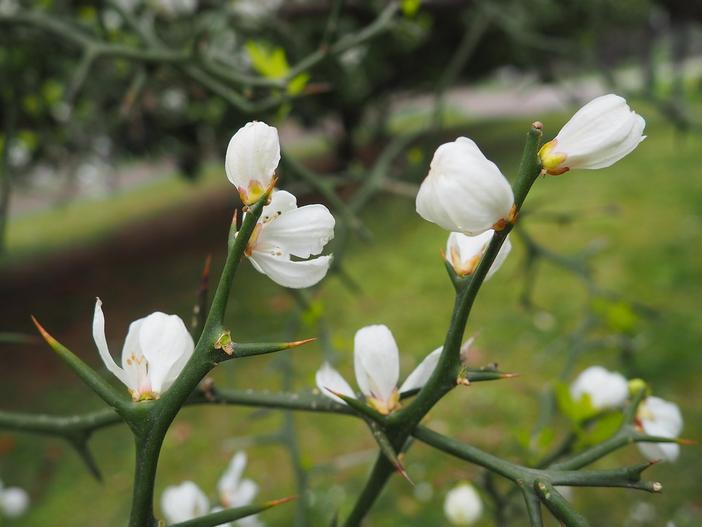Hardy Orange
(Citrus trifoliata)
Hardy Orange (Citrus trifoliata)
/
/

Teresa Grau Ros
CC BY-SA 2.0
Image By:
Teresa Grau Ros
Recorded By:
Copyright:
CC BY-SA 2.0
Copyright Notice:
Photo by: Teresa Grau Ros | License Type: CC BY-SA 2.0 | License URL: https://creativecommons.org/licenses/by-sa/2.0/ | Uploader: tgrauros | Publisher: Flickr




















































































Estimated Native Range
Summary
Citrus trifoliata, commonly known as Hardy Orange, is a deciduous shrub or small tree native to forested areas and riverbanks in central and northern China. It typically grows to a height of 8-20 feet and a width of 6-15 feet. The plant has a spiny, densely branched form, and during the spring and summer, it produces showy white flowers with pink stamens, measuring 3–5 cm (1.2–2.0 in) in diameter. The flowers are less fragrant than those of true citrus but still offer a mild scent. The leaves are trifoliate, glossy green, and emit a spicy aroma when crushed. Hardy Orange is particularly noted for its bright yellow, spherical fruits that ripen in the fall, resembling small oranges with a downy surface and a fuzzy texture akin to a peach. The fruit is aromatic, distinct from other citrus, and contains numerous seeds.
Hardy Orange is valued for its ornamental qualities, including its bright green foliage, fragrant flowers, and decorative fruit. It is often used as a barrier hedge due to its dense growth and formidable thorns, as demonstrated by the long-standing hedges at Oklahoma State University. The cultivar ’Flying Dragon’ is notable for its dwarf size and contorted stems. This plant is cold-hardy to USDA zone 6, tolerating moderate frost and snow. It is adaptable to a range of soil types, provided they have good drainage, and prefers full sun. While Hardy Orange can be used as rootstock to increase the cold hardiness of other citrus varieties, it can also be invasive outside its native range, so gardeners should check local regulations before planting.CC BY-SA 4.0
Hardy Orange is valued for its ornamental qualities, including its bright green foliage, fragrant flowers, and decorative fruit. It is often used as a barrier hedge due to its dense growth and formidable thorns, as demonstrated by the long-standing hedges at Oklahoma State University. The cultivar ’Flying Dragon’ is notable for its dwarf size and contorted stems. This plant is cold-hardy to USDA zone 6, tolerating moderate frost and snow. It is adaptable to a range of soil types, provided they have good drainage, and prefers full sun. While Hardy Orange can be used as rootstock to increase the cold hardiness of other citrus varieties, it can also be invasive outside its native range, so gardeners should check local regulations before planting.CC BY-SA 4.0
Plant Description
- Plant Type: Tree, Shrub
- Height: 8-20 feet
- Width: 6-15 feet
- Growth Rate: Slow
- Flower Color: White
- Flowering Season: Spring
- Leaf Retention: Deciduous
Growth Requirements
- Sun: Full Sun, Part Shade
- Water: Medium
- Drainage: Medium, Fast
Common Uses
Bee Garden, Bird Garden, Border Plant, Butterfly Garden, Deer Resistant, Edible*Disclaimer: Easyscape's listed plant edibility is for informational use. Always verify the safety and proper identification of any plant before consumption., Fragrant, Hedges, Hummingbird Garden, Rabbit Resistant, Salt Tolerant, Showy Flowers, Street Planting
Natural Habitat
native to forested areas and riverbanks in central and northern China
Other Names
Common Names: Trifoliate Orange, Japanese Bitter-Orange, Hardy Orange, Chinese Bitter Orange
Scientific Names: , Citrus trifoliata,
GBIF Accepted Name: Citrus trifoliata hort. ex M.Roem.